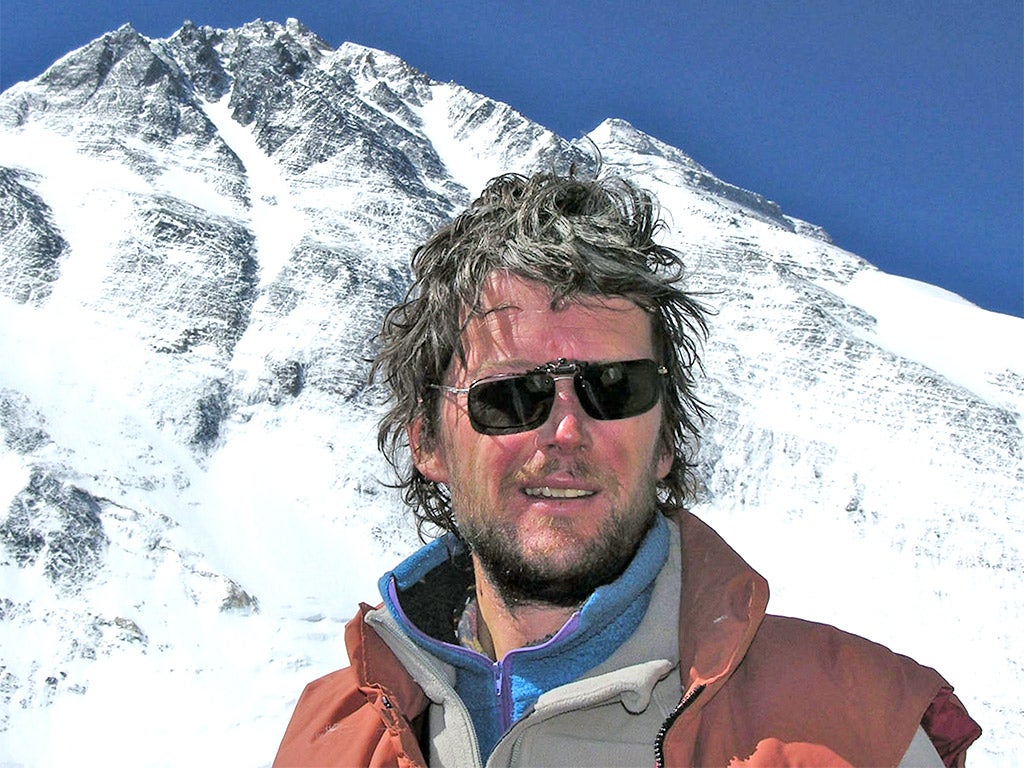Lincoln Hall: Mountaineer who miraculously survived a night left for dead on Everest

Overcome by a severe form of altitude sickness, and showing no vital signs, Lincoln Hall was left for dead near the summit of Mount Everest by his Sherpa guides. The next morning, another climbing party found him sitting cross-legged near a precipitous drop, frostbitten and delirious, but still alive. "I imagine you're surprised to see me here," he told them.
It was May 2006, and Hall had just survived a night alone at more than 28,000ft, without oxygen or protective clothing. He had resolved, he explained later, that "I can't die, because I'm going back to my family. I wasn't going to let it happen; I just had to stay alive".
The extraordinary survival tale made Hall a celebrity, and gave him an aura of indestructibility that has made his death from mesothelioma, at 56, seem all the more shocking. "We thought right to the end that he'd be able to fight his way through this again... but I guess we have to finally admit that he wasn't invincible," said his long-time friend and climbing partner, Simon Balderstone.
He and others close to Hall – believed to have contracted the rare cancer because of exposure to asbestos in his youth – are mourning not only an internationally respected climber, but a prolific writer with a deep spiritual connection to the region where he tested himself repeatedly. Hall embraced Tibetan Buddhism, took up the Tibetan cause and founded a programme to establish schools in the Himalayas.
Born in Canberra on 19 December 1955, he began rock climbing at 15. "I was amazed to find a whole new world that required intense focus, precise judgement and the willingness to take risks," he wrote later. He studied zoology at the Australian National University, where he joined a mountaineering club, going on to scale peaks in New Zealand, the Andes and Antarctica.
In 1984, he was a member of the first Australian Everest team, which scaled the mountain's north face, forging a new path for climbers without oxygen. While two of his companions reached the top, he stopped a few hundred yards short. "To survive as a mountaineer, the most important skill is knowing when to draw the line, and I could see it then as clearly as if it were painted in the snow," he said.
White Limbo, about the expedition, was just one of a dozen or so books which Hall wrote – about his own experiences, and about fellow mountaineers and adventurers, including Douglas Mawson, the Australian Antarctic explorer. Dead Lucky was his account of surviving his second assault on Everest, which also inspired a 2008 documentary, Miracle on Everest.
This time Hall reached the summit; however, on his way down, he collapsed, struck by cerebral edema, a brain swelling that causes hallucinations and extreme fatigue. The Sherpas spent hours trying to revive him and drag him to safety, but were eventually ordered to leave by the expedition leader. They took Hall's pack, sleeping bag, water, oxygen and food. His death was announced, and his family informed.
The next morning, an expedition led by an American guide, Don Mazur, found him, wearing just a thin fleece top, and with no hat, gloves or sunglasses. They abandoned their summit bid to save him. Hall, who lost a toe and the tips of eight fingers, attributed his survival partly to his training in deep-breathing meditation and his decades of mountaineering experience, which had "hard-wired" him never to give up.
Hall's writings on Tibet earned him a personal letter of thanks from the Dalai Lama. In 2002 he set up the Australian Himalayan Foundation. In recent years, he and his family – his wife, Barbara, and their two sons, Dylan and Dorje – moved to the Blue Mountains, west of Sydney. Hall, who helped his father build two cubbyhouses from asbestos sheets when in his 20s, was diagnosed with mesothelioma last year.
Friends remembered him as perpetually good-humoured and relaxed. James Woodford, an Australian journalist who climbed an iceberg with him in Antarctica in 1997, reached the summit to find Hall performing "a very long, very impressive and very strong headstand". "He was truly the coolest person you could ever be in a tight spot with," recalled a fellow Australian mountaineer, Peter Cocker.
Balderstone said: "There were very few tougher, better climbers in the world, and very few better people. He was... a simply wonderful human being and a wonderful humanitarian."
Kathy Marks
Lincoln Ross Hall, Australian mountaineer: born Canberra 19 December 1955; married Barbara (two sons); died Sydney 20 March 2012.
Join our commenting forum
Join thought-provoking conversations, follow other Independent readers and see their replies
Comments
Bookmark popover
Removed from bookmarks